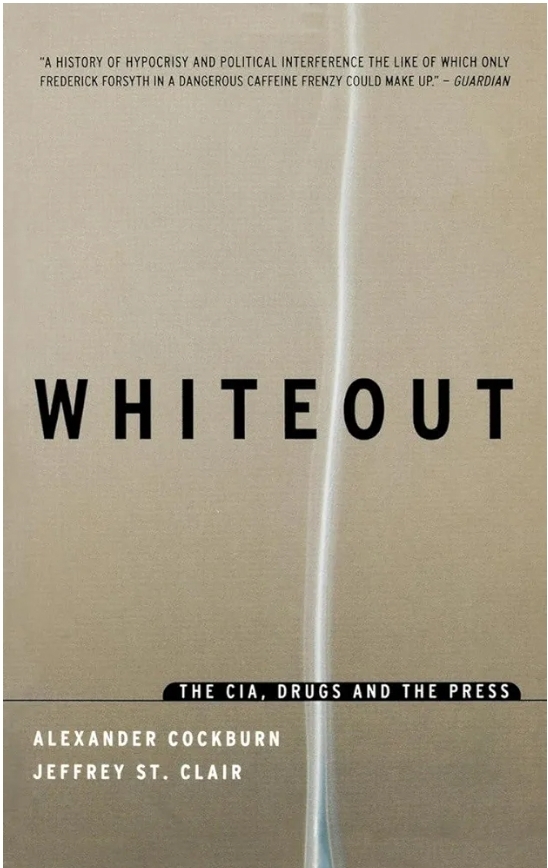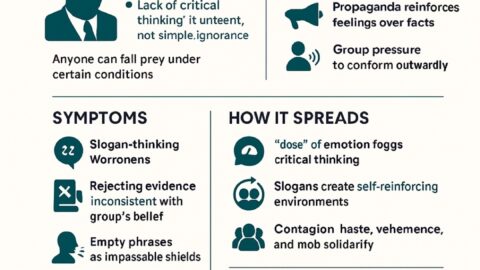“Whiteout: The CIA, Drugs, and the Press” is a comprehensive examination of the CIA’s involvement in drug trafficking and the role of the mainstream media in covering up or downplaying these activities. Written by Alexander Cockburn, a prominent journalist and political commentator, and Jeffrey St. Clair, an investigative journalist, the book was published in 1998. It expands on the controversial claims made by journalist Gary Webb in his groundbreaking “Dark Alliance” series, detailing how the CIA has been involved in or turned a blind eye to drug trafficking by its allies throughout its history.
Key Themes and Arguments:
- CIA’s Historical Involvement in the Drug Trade:
- Cockburn and St. Clair argue that the CIA’s involvement in drug trafficking is not an isolated or recent phenomenon but rather a consistent part of its operations since its inception. They provide a historical account of CIA activities from World War II to the Cold War, demonstrating how the agency has repeatedly collaborated with drug traffickers to advance U.S. foreign policy objectives.
- The book chronicles various instances where the CIA allied with drug dealers and cartels to fund covert operations, including in Southeast Asia during the Vietnam War, Central America during the 1980s, and Afghanistan during the Soviet invasion.
- Detailed Case Studies of CIA Complicity:
- The authors provide detailed case studies of CIA involvement in drug trafficking, such as:
- The Golden Triangle in Southeast Asia: During the Vietnam War, the CIA allegedly supported Laotian drug lord Vang Pao and the Hmong army, both of whom were heavily involved in the opium trade. The agency used its Air America fleet to transport arms and supplies, which were reportedly used to also transport heroin.
- The Iran-Contra Affair: The book revisits the infamous Iran-Contra scandal, where the CIA was implicated in arms sales to Iran and the covert funding of Nicaraguan Contras. Cockburn and St. Clair argue that the Contras were heavily involved in cocaine trafficking into the U.S., with the knowledge and tacit approval of the CIA.
- Afghanistan and the Mujahideen: During the 1980s, the CIA supported the Mujahideen in Afghanistan to fight against Soviet forces. The book claims that the agency overlooked or facilitated the heroin trade that funded the Mujahideen’s war efforts, leading to a surge in global heroin supply.
- The authors provide detailed case studies of CIA involvement in drug trafficking, such as:
- Media Complicity and Suppression:
- Cockburn and St. Clair are highly critical of the mainstream media’s role in suppressing or discrediting stories about the CIA’s involvement in drug trafficking. They argue that major media outlets, such as The New York Times, Washington Post, and Los Angeles Times, either downplayed or outright attacked journalists like Gary Webb, who exposed these issues.
- The book explores how these media organizations, due to their relationships with government agencies and reliance on official sources, often avoid reporting stories that could damage the reputation of the CIA or other government entities. They highlight the backlash against Webb’s “Dark Alliance” series as a prime example of media complicity in protecting the CIA from scrutiny.
- Government Denial and Cover-Up Tactics:
- “Whiteout” argues that the CIA and other government agencies have actively engaged in cover-ups and disinformation campaigns to hide their involvement in the drug trade. The authors describe various tactics used by the CIA to discredit whistleblowers, manipulate public opinion, and obstruct independent investigations.
- Cockburn and St. Clair assert that the CIA often employs “plausible deniability,” distancing itself from operations or individuals implicated in drug trafficking while still benefiting from their activities. This approach allows the agency to avoid direct accountability while pursuing its strategic objectives.
- The Impact of Drug Policies and Covert Operations:
- The book discusses the broader impact of U.S. drug policies and covert operations on global drug trafficking and domestic drug problems. It argues that U.S. efforts to combat drugs, such as the War on Drugs, are often hypocritical and counterproductive, given the CIA’s involvement in drug trafficking.
- The authors suggest that U.S. foreign policy has frequently prioritized geopolitical goals over genuine efforts to combat the drug trade, resulting in devastating consequences for both the countries involved and marginalized communities in the U.S.
Specific Examples and Evidence:
- CIA and Latin American Drug Lords: Cockburn and St. Clair provide numerous examples of CIA collaboration with Latin American drug traffickers, such as the Contras in Nicaragua and drug lords in Colombia. They argue that the agency viewed these partnerships as necessary to counter communist influences in the region, even if it meant supporting drug trafficking networks.
- Media Suppression of Stories: The book documents specific instances where major news outlets either failed to report or actively discredited stories about CIA drug connections. It includes interviews with journalists who faced pressure or lost their jobs for pursuing such stories.
- Official Reports and Whistleblower Testimonies: The authors draw on a range of sources, including declassified documents, official government reports, and testimonies from whistleblowers and former CIA operatives, to support their claims of the CIA’s long-standing involvement in drug trafficking.
Controversy and Criticism:
- Media and Academic Pushback: Similar to Webb’s “Dark Alliance,” “Whiteout” faced skepticism and criticism from some mainstream media outlets and academics. Critics argued that the book relied on circumstantial evidence and lacked conclusive proof of direct CIA involvement in drug trafficking. However, supporters of the book praised its comprehensive research and willingness to challenge official narratives.
- Impact on Public Perception and Policy: Despite the controversy, “Whiteout” contributed to ongoing debates about government accountability, media ethics, and U.S. foreign policy. It raised awareness of the potential for government complicity in illegal activities and reinforced calls for greater transparency and oversight of intelligence agencies.
Legacy and Impact:
- Influence on Investigative Journalism: “Whiteout” is considered an important work in the tradition of investigative journalism, challenging established narratives and highlighting the need for independent reporting. It has inspired other journalists and authors to continue investigating government misconduct and cover-ups.
- Reassessment of the CIA’s Role in Drug Trade: The book has contributed to a broader reassessment of the CIA’s role in the global drug trade, prompting discussions about the agency’s methods and the ethical implications of its covert operations. It remains a significant reference for those questioning the integrity and transparency of U.S. intelligence activities.
“Whiteout: The CIA, Drugs, and the Press” by Alexander Cockburn and Jeffrey St. Clair provides a thorough and provocative examination of the CIA’s involvement in drug trafficking and the complicity of mainstream media in suppressing these stories. By presenting a wide range of evidence and case studies, the authors argue that the CIA has repeatedly collaborated with drug traffickers to further its geopolitical objectives, often at the expense of truth, justice, and the public interest. The book remains a compelling read for anyone interested in U.S. foreign policy, intelligence operations, and media ethics.







